Nothing is more extraordinary than the navigation of Magellan upon this ocean, which he called Pacific, because for four months no storm assailed him upon it. The privations endured by the crews during this long space of time were excessive. The biscuit was nothing more than dust mixed with worms, while the water had become bad and gave out an unbearable smell. The sailors were obliged to eat mice and sawdust to prevent themselves from dying of hunger, and to gnaw all the leather that it was possible to find. As it was easy to foresee under these circumstances, the crews were decimated by scurvy. Nineteen men died, and thirty were seized with violent pains in their arms and legs, which caused prolonged sufferings. At last, after having sailed over more than 12,000 miles without meeting with a single island, in a sea where so many and such populous archipelagos were destined to be discovered, the fleet came upon two desert and sterile islands, called for that reason the Unfortunate Islands, but of which the position is indicated in much too contradictory a manner, for it to be possible to recognize them.
In 12° north latitude and 146° longitude, on Wednesday the 6th of March, the navigators discovered successively three islands, at which they greatly desired to stop to recruit, and take in fresh provisions; but the islanders who came on board stole so many things, without the possibility of preventing them, that the sailors were obliged to give up the idea of remaining there. The natives contrived even to carry off a long boat. Magellan, indignant at such daring, made a descent with forty armed men, burned some houses and boats, and killed seven men. These islanders had neither chief, king, nor religion. Their heads were covered with palm-leaf hats, they wore beards, and their hair descended to their waists. Generally of an olive tint, they thought they embellished themselves by colouring their teeth black and red, while their bodies were anointed with cocoa-nut oil, no doubt in order to protect themselves from the heat of the sun. Their canoes of curious construction, carried a very large matting sail, which might have easily capsized the boat if the precaution had not been taken of giving a more stable trim by means of a long piece of wood kept at a certain distance by two poles; this is what is called the "balance." These islanders were very industrious, but had a singular aptitude for stealing, which has gained for their country the name of the Islands of Thieves (Ladrone Islands).
The Ladrones Islands.
From an old print.
On the 16th of March was seen, at about 900 miles from the Ladrones, some high ground; this was soon discovered to be an island which now goes by the name of Samar Island. There Magellan, resolving to give his exhausted crews some rest, caused two tents to be pitched on land for the use of the sick. The natives quickly brought bananas, palm wine, cocoa-nuts, and fish; for which mirrors, combs, bells, and other similar trifles were offered in exchange. The cocoa-nut, a tree which is valuable beyond all others, supplied these natives with their bread, wine, oil, and vinegar, and besides they obtained from it their clothing and the necessary wood for building and roofing in their huts.
The natives soon became familiar with the Spaniards, and told them that their archipelago produced cloves, cinnamon, pepper, nutmegs, ginger, maize or Indian-corn, and that even gold was found there. Magellan gave this archipelago the name of the St. Lazarus Islands, afterwards changed to that of the Philippines from the name of Philip of Austria, son of Charles V.
This archipelago is formed of a great number of islands which extend in Malaysia, between 5° 32' and 19° 38' north latitude, and 114° 56' and 123° 43' longitude east of the meridian of Paris. The most important are Luzon, Mindoro, Leyte, the Ceylon of Pigafetta, Samar, Panay, Negros, Zebu, Bohol, Palawan, and Mindanao.
When they were a little restored, the Spaniards put to sea again, in order to explore the archipelago. They saw in succession the islands of Cenalo, Huinaugan, Ibusson, and Abarien, as well as another island called Massava, of which the king Colambu could make himself understood by a slave a native of Sumatra, whom Magellan had taken to Europe from India, and who by his knowledge of Malay rendered signal service in several instances. The king came on board with six or eight of his principal subjects. He brought with him presents for the captain-general, and in exchange he received a vest of red and yellow cloth, made in Turkish fashion, and a cap of fine scarlet, while mirrors and knives were given to the members of his suite. The Spaniards showed him all their fire-arms and fired some shots from the cannon in his presence, at which he was much terrified. "Then Magellan caused one of our number to be fully armed," says Pigafetta, "and ordered three men to give him blows with the sword and stiletto, to show the king that nothing could wound a man armed in this manner, which surprised him greatly, and turning to the interpreter he said to the captain through him, 'that a man thus armed, could fight against a hundred.' 'Yes,' replied the interpreter, in the name of the commandant, 'and each of the three vessels carries 200 men armed in this manner.'" The king, astonished by all that he had seen, took leave of the captain, begging him to send two of his men with him, to let them see something of the island. Pigafetta was chosen, and was much satisfied with the welcome that he received. The king told him "that in this island they found pieces of gold as large as nuts, and even eggs, mixed with the earth which they passed through a sieve to find them; all his vessels and even some of the ornaments of his house were of this metal. He was very neatly dressed, according to the custom of the country, and was the finest man that I have seen among these people. His black hair fell upon his shoulders; a silk veil covered his head, and he wore two rings in his ears. From his waist to his knees, he was covered with a cotten cloth embroidered in silk. On each of his teeth there were three spots of gold, arranged in such a manner that one would have said all his teeth were fastened together with this metal. He was perfumed with storax and benzoin. His skin was painted, but its natural tint was olive."
On Easter Day, the Europeans went on shore to celebrate mass in a kind of little church which they had constructed on the sea-shore with sails and branches of trees. An altar had been set up, and during the whole time that the religious ceremony lasted, the king with a large concourse of people, listened in silence and imitated all the motions of the Spaniards. Then a cross having been planted on a hill with great solemnity, they weighed anchor and made for the port of Zebu, as being the best for revictualling the vessels and trading. They arrived there on Sunday, the 7th of April. Magellan sent one of his officers on shore at once with the interpreter, as ambassador to the king of Zebu. The envoy explained that the chief of the squadron was under the orders of the greatest king in the world. The object of the voyage, he added, was the wish to pay him a visit, and at the same time to take in some fresh provisions in exchange for merchandise, and then to go to the Molucca Islands. Such were the motives which caused them to tarry in a country where they came as friends.
"They are welcome," replied the king; "but if they intend to trade they should pay a duty to which all vessels are subject that enter my port, as did, not four days since, a junk from Siam, which came to seek for slaves and gold, to which a Moorish merchant who has remained in this country can testify."
The Spaniard replied that his master was too great a king to submit to such an unreasonable demand. They had come with pacific intentions; but if war were declared, it would be seen with whom they had to deal.
The king of Zebu, warned by the Moorish merchant, of the power of those who stood before him, and whom he took for Portuguese, at length consented to forego his claims. Moreover the king of Massava, who had continued to serve as pilot to the Spaniards, so altered the inclinations of his brother sovereign, that the Spaniards obtained the exclusive privilege of trading in the island, and a loyal friendship was sealed between the king of Zebu and Magellan by an exchange of blood which each drew from his right arm.
From this moment, provisions were brought and cordial relations established. The nephew of the king came with a numerous suite to visit Magellan on board his ship, and the latter took this opportunity to relate to his visitors the wonderful history of the creation of the world, and of the redemption of the human race, and to invite him and his people to become converts to Christianity. They showed no repugnance to being baptized, and on the 14th of April the kings of Zebu and Massava, and the Moorish merchant, with 500 men and as many women received baptism. But what was only a fashion at first, for it cannot be said that the natives knew the religion which they embraced or were persuaded of its truth, became a real frenzy, after a wonderful cure had been effected by Magellan. Having learnt that the father of the king had been ill for two years and was on the point of death, the captain-general promised, that if he consented to be baptized and the natives would burn their idols, he would find himself cured. "He added that he was so convinced of what he said," relates Pigafetta—for it is as well to quote the author verbatim in such a matter—"that he agreed to lose his head if what he promised did not happen immediately. We then made a procession, with all possible pomp, from the place where we were to the sick man's house, whom we found really in a very sad state in that he could neither speak nor move. We baptized him with two of his wives and ten daughters. The captain asked him directly after his baptism how he found himself, and he suddenly replied that thanks to our Lord he was well. We were all witnesses of this miracle. The captain above all rendered thanks to God for it. He gave the prince a refreshing drink, and continued to send him some of it every day till he was quite restored. On the fifth day the invalid found himself quite cured and got up. His first care was to have burned, in the presence of the king and all the people, an idol for which he had great veneration, and which some old women guarded carefully in his house. He also caused some temples which stood on the sea-shore, and in which the people assembled to eat the meat consecrated to their old divinities, to be thrown down. All the inhabitants applauded these acts, and proposed themselves to go and destroy all the idols, even those which were in use in the king's house, crying at the same time 'Vive la Castille!' in honour of the king of Spain."
Near to the Island of Zebu is another island called Matan which had two chiefs, one of whom had recognized the authority of Spain, while the other having energetically resisted it, Magellan resolved to impose it upon him by force. On Friday, the 26th of April, three long boats left for the Island of Matan containing sixty men wearing cuirasses and helmets, and armed with muskets; and thirty balangais bearing the king of Zebu, his son-in-law, and a number of warriors.
The Spaniards waited for day and then to the number of forty-nine leapt into the water, for the boats could not approach the land on account of the rocks and shallow water. More than 1500 natives awaited them, and at once threw themselves upon them, and attacked them in three troops, both in front and flank. The musketeers and the crossbow-men fired on the multitude of warriors from a distance, without doing them much harm, they being protected by their bucklers. The Spaniards, assailed by stones, arrows, javelins, and lances, and overwhelmed by numbers, set fire to some huts to disperse and intimidate the natives. But these, made more furious by the sight of the fire, redoubled their efforts, and pressed the Spaniards on all sides, who had the greatest difficulty in resisting them, when a sad event took place which compromised the issue of the combat. The natives were not slow in remarking that all the blows which they directed towards those parts of their enemies' bodies which were protected by armour, caused no wounds; they set themselves therefore to hurl their arrows and javelins against the lower part of the body, which was undefended. Magellan, wounded in the leg by a poisoned arrow, gave the order for retreat, which, begun in good order, soon changed into such a flight, that seven or eight Spaniards alone remained at his side. With much difficulty they kept moving backwards, fighting as they went, in order to reach the boats. They were already knee-deep in the water when several islanders rushed all together upon Magellan, who, wounded in the arm, was unable to draw his sword; they gave him such a sabre-cut upon his leg that he immediately fell down in the water, where he was speedily despatched. His remaining companions, and among them Pigafetta, every one of whom had been hit, hastily regained the boats. Thus perished the illustrious Magellan on the 27th of April, 1521. "He was adorned with every virtue," says Pigafetta, "and ever exhibited an unshaken constancy in the midst of the greatest adversity. At sea he always condemned himself to greater privations than the rest of his crew. Better versed than any one else in the knowledge of nautical charts, he was perfect in the art of navigation, as he proved by making the tour of the world, which none before him had ventured to do." Pigafetta's funeral eulogy, though a little hyperbolical, is not untrue in the main. Magellan had need of singular constancy and perseverance to penetrate, despite the fears of his companions, into regions peopled by the superstitious spirit of the time with fantastic dangers. Peculiar nautical science was also necessary to achieve the discovery at the extremity of that long coast of the strait which so justly bears his name. He was obliged to give unceasing attention to avoid all untoward accidents while exploring those unknown parts without any exact instruments. That one of the vessels was lost must be imputed to pride and a spirit of revolt in her own captain, more than to any incapacity or want of caution in the captain-general. Let us add with our enthusiastic narrator, "The glory of Magellan will survive his death."
Death of Magellan.
Duarte Barbosa, Magellan's brother-in-law, and Juan Serrano were elected commanders by the Spaniards, who were destined to meet with further catastrophes. The slave who had acted as interpreter up to this time had been slightly wounded during the battle. From the time of his master's death he had kept aloof, not rendering any further service to the Spaniards, and remaining extended upon his mat. After some rather sharp reproofs from Barbosa, who told him that his master's death did not make him a free man, he disappeared all at once. He was gone to the newly-baptized king, to whom he declared that if he could allure the Spaniards into some trap and then kill them, he would make himself master of all their provisions and merchandise. Serrano, Barbosa, and twenty-seven Spaniards were accordingly invited to a solemn assembly to receive the presents destined by the king of Zebu for the Emperor; during the banquet they were attacked unexpectedly, and were all massacred except Serrano, who was led bound to the sea-shore, where he besought his companions to ransom him, for if they did not he would be murdered. But Juan de Carvalho and the others, fearing that the insurrection would become general, and that they might be attacked during the negotiations by a numerous fleet which they would not be able to resist, turned a deaf ear to the unfortunate Serrano's supplications. The ships set sail and reached the Island of Bohol, which was not far distant.
When there, thinking that their numbers were too much reduced to navigate three vessels, they burnt the Concepcion, after having transshipped all that was most precious on board the other vessels. Then, after having coasted along the Island of Panilongon they stopped at Butuan, which forms part of Mindanao, a magnificent island, with numerous ports, and rivers abounding in fish, to the north-west of which lies the Island of Luzon, the most considerable of the Archipelago. The ships touched also at Paloan, where they found pigs, goats, fowls, different kinds of bananas, cocoa-nuts, sugar-canes, and rice, with which they provisioned the ships. This was for them, as Pigafetta expresses it, "a promised land." Among the things which he thought worthy of notice, the Italian traveller mentions the cocks kept by the natives for fighting; a passion which after so many years is still deeply-rooted amongst the population of the whole Philippine Archipelago. From Paloan, the Spaniards next went to the Island of Borneo, the centre of Malay civilization. From that time they had no longer to deal with poverty-stricken people, but with a rich population, who received them with magnificence. Their reception by the rajah is sufficiently curious to warrant a few words being devoted to it. At the landing-place they found two elephants with silk trappings, who bore the strangers to the house of the governor of the town, while twelve men carried the presents which were to be offered to the rajah. From the governor's house where they slept, to the palace of the king, the streets were kept by armed men. Upon descending from their elephants the Spaniards were admitted to a room filled with courtiers. At the end of this room opened another smaller room, hung with cloth of gold, in which were 300 men of the king's guard armed with poniards. Through a door they could then see the rajah, sitting by a table with a little child, chewing betel-nut. Behind him there were only some women.
Etiquette required that the petition to be made must pass in succession through the mouths of three nobles, each of higher rank than the last, before being transmitted, by means of a hollow cane placed in a hole in the wall, to one of the principal officers, who submitted it to the king. Then there was an exchange of presents, after which the Spanish Ambassadors were conducted back to their vessels with the same ceremony as on their arrival. The capital is built on piles in the sea; so that when the tide rises, the women who sell provisions go about the town in boats. On the 29th of July more than 100 canoes surrounded the two vessels, whilst at the same time some junks weighed anchor to approach them more nearly. The Spaniards, fearing to be treacherously attacked, took the initiative and fired off their artillery, which killed a number of people in the canoes, upon which the king excused himself, saying that his fleet had not been directed against them, but against the Gentiles with whom the Mussulmen had daily combats. This island produces arrack (the alcohol of rice), camphor, cinnamon, ginger, oranges, citrons, sugar-canes, melons, radishes, onions, &c. The articles of exchange are copper, quicksilver, cinnabar, glass, woollen cloths, and canvas, and above all iron and spectacles, without mentioning porcelain, and diamonds, some of which were of extraordinary size and value. The fauna comprises elephants, horses, buffaloes, pigs, goats, and domestic poultry. The money in use is of bronze, it is called sapèque and consists of small coins which are perforated with holes, that they may be strung together.
On leaving Borneo the travellers sought for a suitable spot in which to repair their vessels, which were in such great need of it that the men were not less than forty-two days over the work. "The oddest things which I have found in this island," says Pigafetta, "are the trees of which all the leaves are animated. These leaves resemble those of the mulberry, but are not so long; the stalk is short and pointed, and near the stalk on both sides there are two feet. If you touch the leaves, they escape; but when crushed no blood comes from them. I have kept one of them in a box for nine days; when I opened the box, the leaf was walking about in it; I believe they must live upon air." These very curious animals are well known at the present day, and are commonly called leaf-flies (mouches-feuille); they are of a grey-brown, which makes them more easily mistaken for dead leaves, which they exactly resemble in appearance.
It was while in these parts that the Spanish expedition, which, during Magellan's life had preserved its scientific character, began perceptibly to become piratical. Thus, on several occasions, junks were seized upon, and their crews forced by their Spanish captors to pay large ransoms.
The ships next passed by the Archipelago of the Sooloo Islands, the haunt of Malay pirates, who have even now only lately submitted to the Spanish arms; then by Mindanao, which had been already visited, for it was known that the eagerly sought-for Moluccas must be in its neighbourhood, whether more or less remote. At last, after having seen a number of islands, of which the names would not convey much idea to us, on Wednesday, the 6th of November the Spaniards discovered the Archipelago, about which the Portuguese had related such terrifying fables, and two days later they landed at Tidor. Thus the object of the voyage was attained.
The king came to meet the Spaniards, and invited them to go on board his canoe. "He was seated under a silk parasol which covered him entirely. In front of him were placed one of his sons who carried the royal sceptre, two men who had each a golden vase full of water for washing the king's hands, and two others holding small gilt boxes filled with betel." Then the Spaniards made the king come on board the vessels, where they showed him much respect, at the same time loading him and those who accompanied him with presents, which seemed to them very precious. "This king is a Moor, that is to say, an Arab," Pigafetta affirms; "he is nearly forty-five years of age, tolerably well made, and with a fine physiognomy. His clothing consisted of a very fine shirt, the cuffs of which were embroidered in gold; drapery descended from his waist to his feet; a silk veil (no doubt a turban) covered his head, and upon this veil there was a garland of flowers. His name is Rajah-sultan Manzor."
The next day, in a long interview which he had with the Spaniards, Manzor declared his intention of placing himself with the Islands of Ternate and Tidor under the protection of the king of Spain.
This is the place to give some details about the Archipelago of the Moluccas, drawn from Pigafetta's narrative, which we are following step by step in the version that M. Ed. Charton has given, and to which he has added such valuable notes.
This Archipelago properly speaking, comprises the Islands of Gilolo, Ternate, Tidor, Mornay, Batchian, and Misal; but the Banda and Amboyna groups are also often comprehended under the general name of Molucca. Formerly convulsed by repeated volcanic commotions, this Archipelago contains a great number of craters almost all extinct, or in repose during a long succession of years. The air there is burning, and would be almost unfit to breathe, if frequent rains did not fall and refresh the atmosphere. The natural productions are extremely valuable. In the first rank must be placed the sago-tree, of which the pith called sago takes, with yams, the place of cereals throughout Malacca. As soon as the tree is cut down, the pith is extracted, which is then grated, passed through a sieve, and afterwards cut up in the form of small rolls, which are dried in the shade. There are also the mulberry, the clove, the nutmeg, the camphor, and pepper-trees; in fact all the spice-trees and all the tropical fruits. The forests contain some valuable kinds of wood, ebony, iron-wood, teak, famous for its strength and employed from the most ancient times in costly buildings, and the Calilaban laurel, which yields an aromatic essential oil that is highly prized. At this period domestic animals were not numerous in the Moluccas, but among the wild animals the most curious were the babiroussa, an enormous wild boar with long tusks bent backwards; the opossum, a kind of didelphis a little larger than our squirrel; the phalanger, a marsupial which lives in thick, dark forests, where it feeds upon leaves and fruit; and the tarsier, a kind of jerboa, a very harmless, inoffensive little animal with reddish-coloured hair, about the size of a rat, but whose body bears some resemblance to that of an ape. Among the birds, the most remarkable were the parroquets and cockatoos, the birds of Paradise of which so many fabulous accounts were given, and which until then had been believed to be without legs, the king-fishers, and the cassowaries, great wading-birds almost as large as ostriches.
A Portuguese named Lorosa had been long settled in the Moluccas, and to him the Spaniards forwarded a letter, in the hope that he would betray his country and attach himself to Spain. They obtained the most curious information from him with regard to the expeditions which the king of Portugal had despatched to the Cape of Good Hope, to the Rio de la Plata and to the Moluccas; but from various circumstances these latter expeditions had not been able to take place. He himself had been sixteen years in this Archipelago; the Portuguese had been installed there for ten years, but upon this fact they preserved the most complete silence. When Lorosa saw the Spaniards making their preparations for departure, he came on board with his wife and his goods to return to Europe. On the 12th of November all the merchandise destined for barter was landed, it being chiefly derived from the four junks which had been seized in Borneo. Certainly the Spaniards traded to great advantage, but nevertheless not to so great an extent as they might have done, for they were in haste to return to Spain. Some vessels from Gilolo and Batchian came also to trade with them, and a few days later they received a considerable stock of cloves from the king of Tidor. This king invited them to a great banquet which he said it was his custom to give when a vessel or junk was loaded with the first cloves. But the Spaniards, remembering what had happened to them in the Philippines, refused the invitation while presenting compliments and excuses to the king. When their cargo was completed, they set sail. Scarcely had the Trinidad put to sea before it was perceived that she had a serious leak, and the return to Tidor as fast as possible was unavoidable. The skilful divers whom the king placed at the disposal of the Spaniards, were unable to discover the hole, and it became necessary to partly unload the ship to make the necessary repairs. The sailors who were on board the Victoria would not wait for their companions, and the ship's officers seeing clearly that the Trinidad would not be fit for the voyage to Spain, decided that she should go to Darien, where her valuable cargo would be discharged and transported across the Isthmus to the Atlantic, where a vessel would be sent to fetch it. But neither the unfortunate vessel nor her crew was destined ever to return to Spain.
The Trinidad, commanded by the alguazil Gonzalo Gomez de Espinosa, who had Juan de Carvalho as pilot, was in so bad a state that after leaving Tidor, she was obliged to anchor at Ternate, in the port of Talangomi, where her crew consisting of seventeen men was immediately imprisoned by the Portuguese. The only reply given to Espinosa's remonstrances was a threat to hang him to the yard of a vessel; and the unfortunate alguazil, after having been transferred to Cochin, was sent to Lisbon, where for seven months he remained shut up in the prison of the Limoeiro with two Spaniards, the sole survivors of the crew of the Trinidad.
As to the Victoria, she left Tidor richly laden under the command of Juan Sebastian del Cano, who, after having been simply a pilot on board one of Magellan's ships, had taken the command of the Concepcion on the 27th of April, 1521, and who succeeded to Juan Lopez de Carvalho, when the latter was superseded in his command for incapacity. The crew of the Victoria was composed of only fifty-three Europeans and thirteen Indians. Fifty-four Europeans remained at Tidor on board the Trinidad.
After passing amidst the islands of Caioan, Laigoma, Sico, Giofi, Cafi, Laboan, Toliman, Batchian, Mata, and Batu, the Victoria left this latter island to the west, and steering west-south-west, stopped during the night at the island of Xulla or Zulla. At thirty miles from thence the Spaniards anchored at Booro, (the Boero of Bougainville), where the ship was revictualled. They stopped 105 miles further on, at Banda, where mace and nutmegs are found, then at Solor, where a great trade in white sandal-wood is carried on. They spent a fortnight there to repair their ship, which had suffered much, and there they laid in an ample provision of wax and pepper; then they anchored at Timor, where they could only obtain provisions by retaining by stratagem the chief of the village and his son, who had come on board the ship. This island was frequented by junks from Luzon, and by the "praos," from Malacca and Java, which traded largely there in sandal-wood and pepper. A little further on the Spaniards touched at Java, where, as it appears, suttee was practised at this time, as it has been in India until quite recently.
Among the stories which Pigafetta relates, without entirely believing them, is one which is most curious. It concerns a gigantic bird the Epyornis, of which the bones and the enormous eggs were discovered in Madagascar about the year 1850. It is an instance proving the caution needed before rejecting as fictitious many apparently fabulous legends, but which on examination may prove to possess a substratum of truth. "To the north of Greater Java," says Pigafetta, "in the gulf of China, there is a very large tree called campanganghi inhabited by certain birds called garula, which are so large and strong that they can bear away a buffalo and even an elephant, and carry it as they fly to the place where the tree puzathaer is." This legend has been current ever since the ninth century, among the Persians and Arabs, and this bird plays a wonderful part in Arabian tales under the name of the roc. It is not surprising, therefore, that Pigafetta found an analogous tradition among the Malays.
After leaving greater Java, the Victoria rounded the peninsula of Malacca, which had been subjugated to Portugal by the great Albuquerque ten years before. In the immediate neighbourhood are Siam and Cambodia, and Tchiampa, where rhubarb grows. This substance is discovered in the following manner. "A company of from twenty to five-and-twenty men go into the wood, where they pass the night in the trees, to protect themselves from lions (note here, that there are no lions in this country), and other ferocious beasts, and also that they may better perceive the odour of the rhubarb, which the wind wafts towards them. In the morning they go towards the place whence came the odour, and search there for the rhubarb until they find it. Rhubarb is the putrefied wood of a great tree, and acquires its odour even from its putrefaction, the best part of the tree is the root, nevertheless the trunk, which they call calama, has the same medicinal virtue."
Decidedly it is not from Pigafetta that we should seek to acquire botanical knowledge; we should run a great risk of deceiving ourselves if we took in earnest the nonsense that the Moor told him from whom he drew his information. The Lombard traveller gives us also fantastic details about China with the greatest seriousness, and falls into the grave errors, which his contemporary Duarte Barbosa had avoided. It is to the latter we owe the information that the trade in anfiam or opium has existed from this period. When once the Victoria had left the shores of Malacca, Sebastian del Cano took great care to avoid the coast of Zanguebar, where the Portuguese had been established since the beginning of the century. He kept to the open sea as far as 42° south latitude, and for nine weeks he was obliged to keep the sails furled, on account of the constant west and north-west winds, which ended in a fearful storm. To keep to this course required great perseverance on the part of the captain, with a settled desire on his part to carry his enterprise to a successful issue. The vessel had several leaks, and a number of the sailors demanded an anchorage at Mozambique, for the provisions which were not salted having become bad, the crew had only rice and water for food and drink. At last on the 6th of May, the Cape of Tempests was doubled and a favourable issue to the voyage might be hoped for. Nevertheless, many vexatious accidents still awaited the navigator. In two months, twenty-one men, Europeans and Indians, died from privations, and if on the 9th July they had not landed at Santiago, one of the Cape de Verd Islands, the whole crew would have died of hunger. As this archipelago belonged to Portugal, the sailors took care to say that they came from America, and carefully concealed the route which they had discovered. But one of the sailors having had the imprudence to say that the Victoria was the only vessel of Magellan's squadron which had returned to Europe, the Portuguese immediately seized the crew of a long-boat, and prepared to attack the Spanish vessel. However, Del Cano on board his vessel was watching all the movements of the Portuguese, and suspecting, by the preparations which he saw, that there was an intention of seizing the Victoria, he set sail, leaving thirteen men of his crew in the hands of the Portuguese. Maximilian Transylvain assigns a different motive from the one given by Pigafetta, for the anchorage at the Cape de Verd Islands. He asserts that the fatigued state of the crew, who were reduced by privations, and who in spite of everything had not ceased to work the pumps, had decided the captain to stop and buy some slaves to aid them in this work. Having no money the Spaniards would have paid with some of their spices, which would have opened the eyes of the Portuguese.
"To see if our journals were correctly kept," says Pigafetta, "we inquired on shore what day of the week it was. They replied that it was Thursday, which surprised us, because according to our journals it was as yet only Wednesday. We could not be persuaded that we had made the mistake of a day; I was more astonished myself than the others were, because having always been sufficiently well to keep my journal, I had uninterruptedly marked the days of the week, and the course of the months. We learnt afterwards, that there was no error in our calculation, for having always travelled towards the west, following the course of the sun, and having returned to the same point, we must have gained twenty-four hours upon those who had remained stationary; one has only need of reflection to be convinced of this fact."
Sebastian del Cano rapidly made the coast of Africa, and on the 6th of September entered the Bay of San Lucar de Barrameda, with a crew of seventeen men, almost all of whom were ill. Two days later he anchored before the mole at Seville, after having accomplished a complete circuit of the world.
As soon as he arrived, Sebastian del Cano went to Valladolid, where the court was, and received from Charles V. the welcome which was merited after so many difficulties had been courageously overcome. The bold mariner received permission to take as his armorial bearings, a globe with this motto, Primus circumdedisti me, and he also received a pension of 500 ducats.
The rich freight of the Victoria, decided the Emperor to send a second fleet to the Moluccas. The supreme command of it was not, however, given to Sebastian del Cano; it was reserved for the commander Garcia de Loaisa, whose only claim to it was his grand name. However, after the death of the chief of the expedition, which happened as soon as the fleet had passed the Strait of Magellan, Del Cano found himself invested with the command, but he did not hold it long, for he died six days afterwards. As for the ship Victoria, she was long preserved in the port of Seville, but in spite of all the care that was taken of her, she at length fell to pieces from old age.
END - OF PART II – Chapter II
Reference :
Title: Celebrated Travels and Travellers
Author: Jules Verne
http://www.gutenberg.org/files/24777/24777-h/24777-h.htm#fax35
The Death of Magellan, 1521
http://www.eyewitnesstohistory.com/magellan.htm
Youtube Videos :
Author: Jules Verne
http://www.gutenberg.org/files/24777/24777-h/24777-h.htm#fax35
The Death of Magellan, 1521
http://www.eyewitnesstohistory.com/magellan.htm
Youtube Videos :
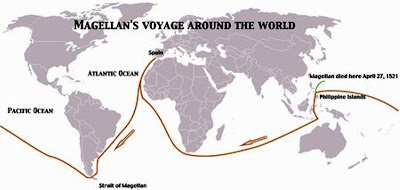


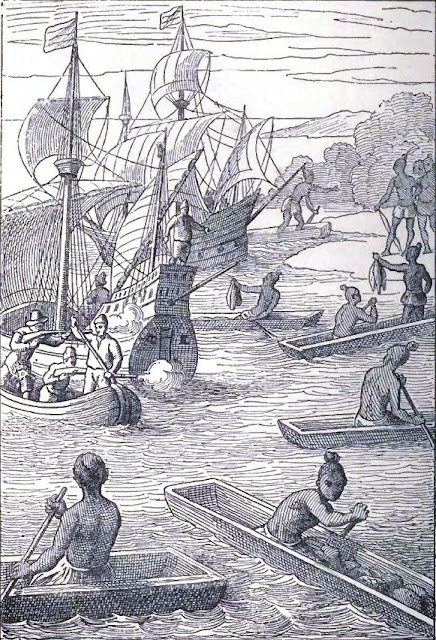

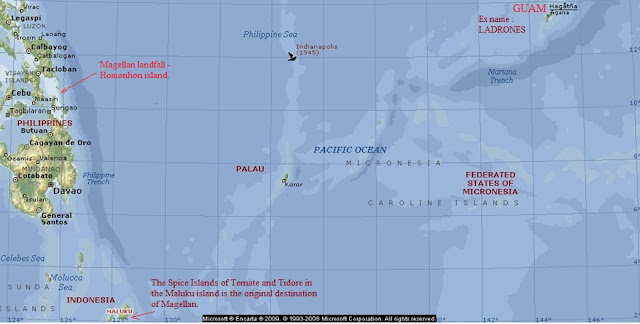
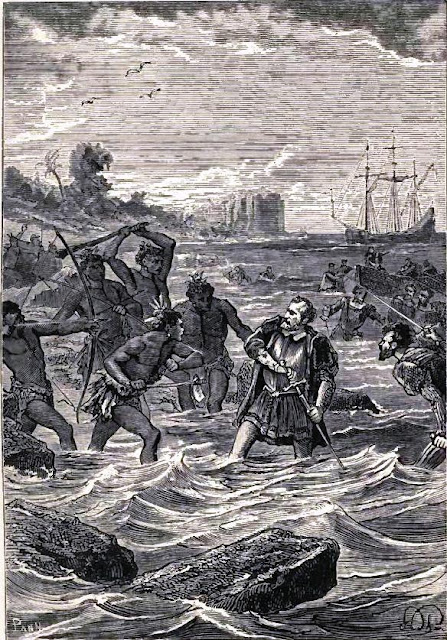




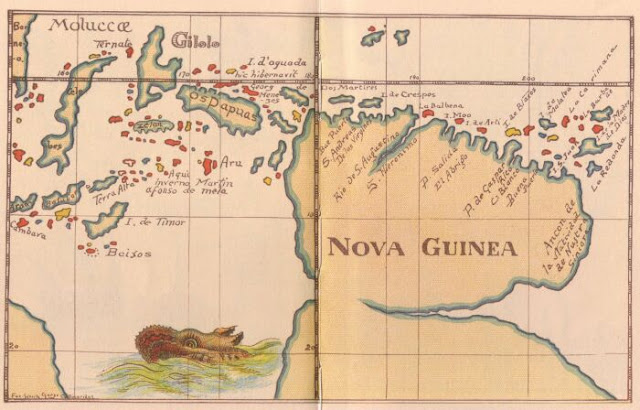

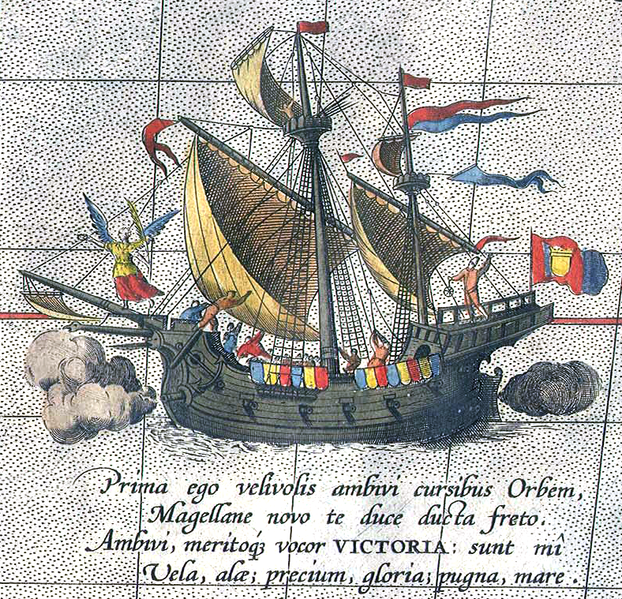
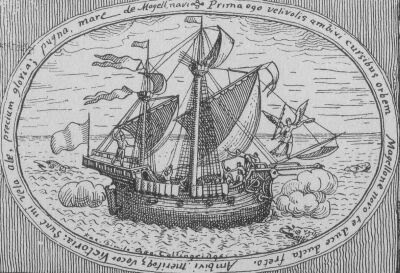
No comments:
Post a Comment